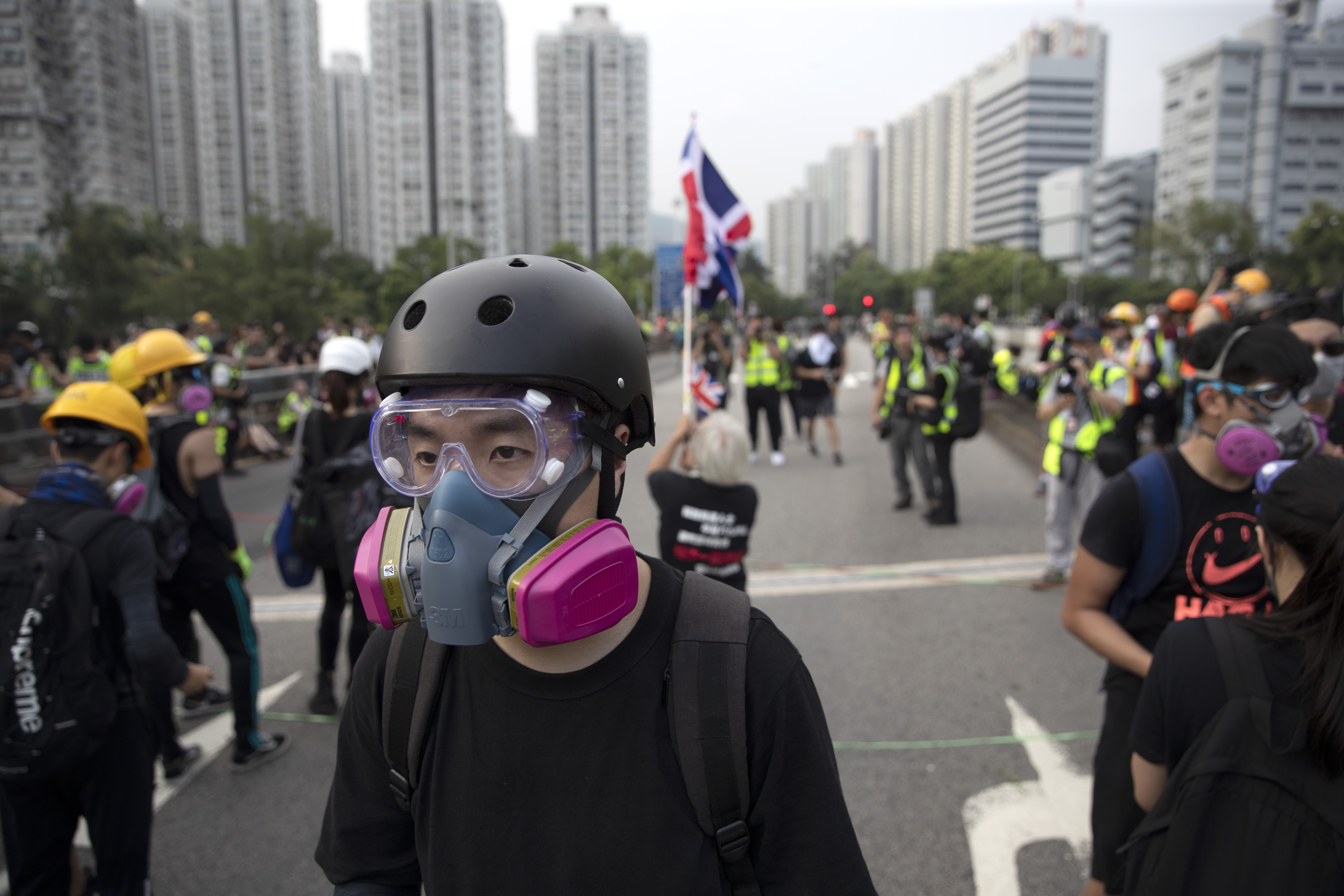Die-hard Hong Kong protesters defend tactics as unity cracks

In this Aug. 16, 2019, photo, Wayne, a 33-year-old self-described “front line” protester, stands along with other demonstrators in Tai Po, on Hong Kong’s outskirts. Hong Kong’s protest movement has reached a moment of reckoning after protesters occupying the airport held two mainland Chinese men captive, and pro-democracy lawmakers and fellow demonstrators question whether the whole operation has gone too far. (AP Photo/Vincent Thian)
HONG KONG — On a recent sweltering Saturday, a day now reserved for protest in Hong Kong, a demonstrator named Wayne stepped past a row of plastic barricades, lifted a pair of binoculars and squinted.
Four hundred meters away, a line of riot police stood with full-length shields, batons and tear-gas launchers.
It was a familiar sight for Wayne after more than two months on the front lines of Hong Kong’s turbulent pro-democracy demonstrations. Along with hard hats and homemade shields, face-offs with police have become part of the 33-year-old philosophy professor’s new normal.
The stories of Wayne and three other self-described “front line” protesters interviewed by The Associated Press provide insights into how what started as a largely peaceful movement against proposed changes to the city’s extradition law has morphed into a summer of tear gas and rubber bullets. They spoke on condition they be identified only by partial names because they feared arrest.
The movement has reached a moment of reckoning after protesters occupying Hong Kong’s airport last week held two mainland Chinese men captive, beating them because they believed the men were infiltrating their movement.

In the aftermath, pro-democracy lawmakers and fellow demonstrators — who have stood by the hard-liners even as they took more extreme steps — questioned whether the operation had gone too far.
It was the first crack in what has been astonishing unity across a wide range of protesters that has kept the movement going. It gave pause to the front-liners, who eased off the violence this past weekend, though they still believe their more disruptive tactics are necessary to get the government to answer the broader movement’s demands.
The demands grew from opposing legislation that would have allowed Hong Kong residents to be extradited for trials in mainland China’s murky judicial system to pressing for democratic elections, Hong Kong leader Carrie Lam’s resignation and an investigation into allegations of police brutality at the demonstrations.
The protesters on the front lines are the ones who throw bricks at police and put traffic cones over active tear gas canisters to contain the fumes. They have broken into and trashed the legislature’s chambers, blocked a major tunnel under Hong Kong’s harbor, besieged and pelted police headquarters with eggs and halted rush-hour subways by blocking the train doors from closing.
To Lam, these are “violent rioters” bent on destroying the city’s economy. To China’s ruling Communist Party, their actions are “the first signs of terrorism.”
To these most die-hard protesters, there’s no turning back.
“The situation has evolved into a war in Hong Kong society,” said Tin, a 23-year-old front-line demonstrator. “It’s the protesters versus the police.”
When Hong Kong’s youth banded together for this summer’s protests, they established a few rules: They would not have clear leaders, protecting individuals from becoming symbols or scapegoats. And they would stick together, no matter their methods.
The peaceful protesters would not disavow the more extreme, sometimes violent tactics of the front-liners, who would distract the police long enough for others to escape arrest.
These were lessons learned from 2014, when the Occupy Central pro-democracy movement fizzled after more than two months without winning any concessions. Many involved feel internal divisions partly led to defeat.
Chong, a 24-year-old front-liner, said everyone’s opinion is heard and considered, and they decide on the right path together. But no decision is absolute: The demonstrators have pledged to not impede actions they may disagree with.
Two massive marches roused Chong and others who had given up on political change after the failure of Occupy Central, also dubbed the Umbrella Revolution.
On consecutive weekends in June, hundreds of thousands of people took to the streets to oppose the extradition bill. It struck at fears that China is eroding civil rights that Hong Kong residents enjoy under the “one country, two systems” framework.
“I didn’t think I would ever do this again,” said Chong, who quit his job as an environmental consultant to devote himself to the protests. “But this time, society is waking up.” /muf